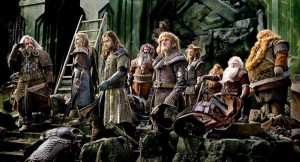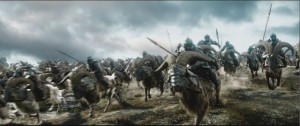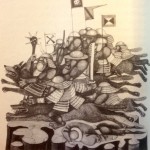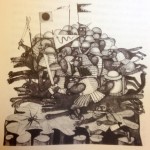It has taken me ages to get through my edits for Victory of the Hawk, you guys. But now that the end is in sight, I’ve had some cycles free up finally. Which means I can get back to the last few bits of my Trilingual Hobbit Reread!
And Chapter 17 of The Hobbit, “The Clouds Burst”, is pretty much where the Battle of Five Armies gets down to Serious Business. Which is a good place to be, given the movie that’s about to come out next month, yes?
General Notes:
Opening salvo: Bard leading a party to the Mountain to give Thorin one last shot at not being an asshole. Thorin is not interested until Bard whips out the Arkenstone, at which point he is very interested indeed. And by interested, I mean, ready to kill Bilbo–at least, of course, until Gandalf shows up.
This should be a really interesting moment to see play out on screen. We’ve already established in the first movie that Thorin regretted being a jerk to Bilbo through most of that film, and so by the end of that one, Thorin’s quite sympathetic. We’re going to need to see Thorin swing hard back to being an asshole, presumably falling prey to the gold-sickness that had afflicted his grandfather, to get to this point.
It’s important to note that “more than one of the dwarves” are described as feeling shame and pity at his going–and I’m hoping we’ll see that on screen as well. I’m expecting we’ll see the most reaction out of Balin, maybe Bofur, and Kili and Fili as the dwarves most likely to get lines. (This has, since I originally started this post, been likely substantiated by what we saw in the last released trailer!)
Then Dain’s army shows up, and this ought to be yet another awesome thing on screen, particularly with the description of the dwarven warriors:
Each one of his folk was clad in a hauberk of steel mail that hung to his knees, and his legs were covered with hose of a fine and flexible metal mesh, the secret of whose making was possessed by Dain’s people. The dwarves are exceedingly strong for their height, but most of these were strong even for dwarves. In battle they wielded heavy two-handed mattocks; but each of them had also a short broad sword at his side and a roundshield slung at his back. Their beards were forked and plaited and thrust into their belts. Their caps were of iron and they were shod with iron, and their faces were grim.
Looking forward to seeing the beards done up for war, in particular.
Bard’s folk, the elves, and the dwarves do a lot of going “grr” at each other. Thorin, surprising exactly no one, fails to deliver the demanded gold. Bard’s ready to kick some dwarven ass, though, refreshingly, Thranduil doesn’t want to go to war over gold; let’s hope that plays out in the movies. The dwarves press the matter, though–they are quite ready to go to war over gold.
Just in time, of course, for Gandalf to announce that SURPRISE! You’re all screwed because INCOMING GOBLINS. It will be a point of interest for the third film as to who will be leading this force; in the text, it’s Bolg, son of Azog. But at least as of the end of the second film, Azog is of course still alive, so he will clearly survive to lead the orc forces in the Battle of Five Armies. One rather suspects that perhaps Thorin, Kili, and Fili will go down in a blaze of glory killing Azog once and for all.
Here too is Bilbo being beautifully sensible, putting on the Ring, and mostly staying the hell out of the way. I expect though that movie!Bilbo will have a little bit more to do, given that this’ll be way less interesting to watch on screen. Still, it’s always nice to see a character not being an idiot. Bilbo is not a warrior, even though he does of course defend himself splendidly in Mirkwood against the spiders. That is not, however, at all the same as being a soldier in the middle of a massive war.
And here are a couple of nice creepy images, which should be quite chilling in movie #3 if Jackson chooses to deploy them:
Already many of the goblins were flying back down the river to escape from the trap; and many of their own wolves were turning upon them and rending the dead and the wounded.
And:
Soon actual darkness was coming into a stormy sky; while still the great bats swirled about the heads and ears of elves and men, or fastened vampire-like on the stricken.
In the middle of that, too, we get this rather bleak passage–but there’s grandeur in this entire section, Tolkien’s mastery of his prose shining forth and giving us a taste of what’s to come in The Lord of the Rings:
Victory now vanished from hope. They had only stemmed the first onslaught of the black tide.
And when Thorin and company emerge to join the fray, well, this should certainly look impressive in movie #3, though the bit about red light leaping from their eyes makes me think of Terminators. Or Cylons!
Out leapt the King under the Mountain, and his companions followed him. Hood and cloak were gone; they were in shining armour, and red light leapt from their eyes. In the gloom the great dwarf gleamed like gold in a dying fire.
We get one last little bit of Bilbo whining–though at least to himself. Here, though, honestly, he’s rather justified. Because holy shit battle, and all. And again, he’s being sensible and sticking with the elves, which puts him into a position to see the coming of the deus ex machina Eagles. I can see a risk here of this bit echoing The Return of the King on film too heavily–particularly given that the Hobbit trilogy has echoed the previous movies more than once–but then, Jackson’s going to have to whip out a lot more Eagles for the battle to come based on what Tolkien’s written here.
The chapter ends with Bilbo getting knocked out, which is anticlimatic to be sure–especially after he spots the Eagles.
Final note: I’d like to point out here that this is one of the major parts of the book that I have no problem whatsoever with Jackson going into in depth in the movie, way more depth than Tolkien himself actually does. Tolkien steps back hard from the action here, delivering omniscient narration rather than a tight point of view on Bilbo. Speaking as an author who just had book 3 of her own trilogy dinged hard during editing for too much omniscient narration rather than tight point of view, I’m here to tell you, modern sensibilities definitely favor the latter. It’s supposed to engage the reader’s sympathies more strongly.
And on film, you pretty much have to do that too. You can’t just blow past a massive battle and handwave it all by saying “all this went down while the protagonist was knocked unconscious”. In Jackson’s films, he’s taken the time to get us engaged by all of the characters, not just Bilbo. Accordingly, the battle has to be that much more complex to stage. And I for one am looking forward to seeing it!
French notes:
The chapter title in Bilbo Le Hobbit is “Les nuées éclatent”, I note. Point of interest here is that “clouds” is getting translated here to “nuées”, not “nuages”, which was the word I know. “Nuées” appears to be “clouds” in the sense of “a swarm”, from what I’m seeing in online dictionaries.
And here we have the first full paragraph that I’m able to almost completely parse:
— Je ne change pas d’avis avec le lever et le coucher de quelques soleils, répliqua Thorin. Seriez-vous venu à seule fin de me poser des questions oiseuses? L’armée des elfes n’est pas encore partie comme je l’ai prescrit ! Jusqu’à ce qu’elle s’exécute, c’est en vain que vous voudrez discuter avec moi.
The first sentence here is Thorin saying “I do not change my opinion with the rising and setting of some suns”. I note “avis” here since that’s been a word I keep confusing with “dire” in SuperMemo–when “dire” is used as a noun and not as a verb. Something to explore further!
In the second sentence, I’ve got the two bits that gave me trouble here. One was “à seule fin”, since I got hung up on interpreting “fin” in the sense of “finish”, but here, it’s more like “purpose”. (Note: these two connotations apply in English, too!) And the other was the adjective “oiseuses”, which I didn’t recognize, and which means “idle”. I had to remind myself not to confuse it with the noun “oiseaux”, which is “birds”.
I got the rest of it, including realizing that “n’est pas encore partie” was coming from the passé composé of “partir”, and that “prescrit” was “prescribed”.
Bard has this line to Thorin: “N’y a-t-il donc rien pour quoi vous céderiez un peu de votre or?” And this is fun because of “céderiez”, one of the few times I’ve seen Google Translate completely fail to understand a French verb. This appears to be because of this being the conditional tense of “céder”.
And at this point in this scene, the “old man” with Bard and the Elvenking–who is, of course, Gandalf–opens up his case and brings out the Arkenstone. In the French edition the word used is “cassette”. Which brings up all sorts of amusing imagery involving Gandalf and cassette players.
The translator apparently decided to break up the paragraph involving Thorin’s reaction to the bringing out of the stone, thus:
Enfin, Thorïn rompit le silence, et sa voix était lourde de colère : « Cette pierre appartenait à mon père, et elle est à moi, dit-il. Pourquoi achèterais-je ce qui est mon bien ? »
Toutefois, la curiosité le poussa à ajouter : « Mais comment êtes-vous en possession de l’héritage de ma maison – s’il est utile de poser pareille question à des voleurs ? »
(And wow, I’m looking forward to seeing Richard Armitage snarling these lines in There and Back Again next year. Well, okay, in English. Though it’d be neat to hear him doing it in French, too!)
Words of note to me in the above paragraph:
Rompit: Passé simple of “rompre”, which is “to break”. I picked this up via SuperMemo, and while I had to look up the conjugation, I suspected that’s what the verb was here.
Lourde: “Heavy”. I know this word from the Le Vent du Nord song “Écris-moi”.
Colère: “Anger”. Another word I picked up from SuperMemo, and I STILL have trouble confusing this with “coleur”, the word for “color”.
Appartenait: The imperfect tense of “appartenir”, “to belong”. Another SuperMemo word I’ve had fairly recently.
Thorin yelling at Bard gives me the verb “hurla”, which is the passé simple of hurler–which is “to yell”, NOT “to hurl”. Likewise, Thorin flipping out at Bilbo gives me the interesting turn of phrase “se retournant contre lui”–which, if I look at it literally, reads as “turning against him”. But Tolkien’s original phrase is “turning upon him”, which tells me that “contre” here is meant to be used more as “upon” or “on”.
We also get a fun little bit of phrasing later in the same paragraph. In the English Tolkien writes, “You undersized–burglar!” In the French, it’s “Espèce de bout de…cambrioleur!” As near as I can tell this is a pretty close translation, since I’ve found “espèce de qqch” as an expression used in similarly insulting phrases, and “un bout de qqch” to mean “a bit of something”. Any Francophones want to sanity check me?
I like Gandalf’s line to Thorin to sit the hell down: “Votre souhait est exaucé!” I.e., “Your wish is granted!” I had to look up “exaucé”, though–it’s from the verb “exaucer”, which looks a lot like “exhaust” in English, so I have to be careful to not confuse those. Very close to “exercer” in French as well.
Thorin calls Bilbo “you descendant of rats” in the English, and that translates over almost directly into French: “descendant de rats”. (Naturally, Bilbo goes into a snit about this, which reads rather splendidly in French, at least in a rhythmic sense; I don’t get much of the passage, but my brain keeps trying to hear Martin Freeman saying these words nevertheless.)
It’s probably an indicator of how much Quebec trad I listen to that when I get to Bilbo’s line asking Thorin about “l’or et l’argent”, I keep wanting to set that into music. (In no small part because of Le Vent du Nord’s “Rossignolet”, about which I have enthused many a time before! But also Les charbonniers de l’enfer’s “Yes Very Well”.)
In the section describing the arrival of Dain and his people, this clause leapt out at me: “Les nains sont extrêmement fort pour leur taille”. I almost got this right, except for misinterpreting “sont” as past tense rather than present. It means “dwarves are extremely strong for their size”, and I feel this will be highly relevant when the movie comes out next month!
And here’s a bit of “quoi?”: “Au combat, ils maniaient de lourds bigots à deux mains…” What Tolkien actually wrote was “In battle they wielded heavy two-handed mattocks”–so apparently “bigots” is “mattocks” here, but wow, that looks weird to an Anglophone eye, and I’m all “wait, the dwarves are using racists as weaponry?” To wit: lol. Apparently it’s an archaic translation choice, though–I had to go to fr.wiktionary.org to find it.
HA! “Dain son of Nain” in French becomes “Daïn, fils de Naïn”–which just barely saves it from reading “Dain, son of Dwarf”.
Ooh, a new synonym for “néanmoins”: “nonobstant”, which is “notwithstanding/despite/in spite of”.
Another thing that looks weird to an Anglophone eye: “car Thorïn avait de très nombreux parents…” I.e., “for Thorin had many relatives”. “Parents” here is “relatives”, not “parents”, as it would be read in English.
“Elle fut appelée Bataille des Cinq Armées, et elle fut terrible.”—and here we have the name Battle of Five Armies getting used in the translation. Obligatory note here as well that Tolkien used “Battle of Five Armies”, not “Battle of the Five Armies”, which is what’s in the title of the forthcoming movie.
“En voici l’historique” is what the translator uses when Tolkien says “This is how it fell out”. This caught my eye because “historique” is a noun here, not an adjective, which is what I would have expected it to be. Here, it’s getting used in the sense of “here is the history”.
“Un anneau magique de cette sorte ne représente pas une protection totale au milieu d’une charge de gobelins.”—”A magic ring of that sort is not a complete protection in a goblin charge.” Words to live by! And indeed, Bilbo did!
“Les elfes furent les premiers à charger”–“The elves were the first to charge.” Noting this because of the use of “furent” here for “was”, something I’m seeing all over the battle description in the chapter, and not something I typically saw earlier in the book. (I saw it above in the line that named the battle, too!) “Fut” and “furent” are the passé simple conjugations of être–and here I tried to assume they were conjugations of faire instead. Newbie mistake!
Another point of vocabulary confusion–“cimeterres” is “scimitars”, and not to be confused with “cimetières”, which is “cemeteries”. This made the description of the giant armed goblins quite perplexing there for a minute.
Hee, I like that “Tookish” renders as “tookien” in French.
German notes:
Our chapter title in German is “Die Wolken bersten”. “Die Wolke” is apparently singular for “cloud”, and that is NOT a guess I would have made about that word.
I’m pleased to see, though, after more time spent on German in SuperMemo, that I’m starting to recognize more of the words in the German edition. Like “Nachrichten”–which is “news”. And “Stimmung”, which I had to remind myself is “mood/atmosphere”. And “Meinung”, which is “opinion”.
And right out of the gate I get this delicious example of German compound noun fun: “Sonnenauf-und-untergängen”. Which is to say, “sunrises and sunsets”. Highly interesting to me that the translator chose to write it out like that! If I break it down, “Sonnenaufgängen” is “sunrises”, while “Sonnenuntergängen” is sunsets. So perhaps the translator did it this way to avoid repetition of syllables? I don’t know!
Thorin’s complaint that the elves haven’t buggered off as he demanded gives us “Das Elbenheer”. I had to look that up, since I didn’t recognize “heer”. Which is “host/army”.
When Bard produces the Arkenstone and Thorin yells about how in the world had he gotten it, Bilbo chimes in with this: “»Ich war es,« quietschte Bilbo…” Tolkien uses the word “squeak” in the English, which is what the verb “quietschen” means. Again, not what I would have guessed, since “quiet” is part of the word!
Thorin’s losing it at Bilbo falters a bit, though, when he calls him “Ihr zu kurz geratener — Meisterdieb!” Since “Meisterdieb” is of course “Master thief”, which seems like an awfully strange way to try to insult somebody, no?
Thorin also yells “Elender Hobbit!” at Bilbo, which leaps out at me because of the word “Elender”–because I actually have someone of that name in my family tree! But since it means “miserable”, that says rather unfortunate things about how that word turned into a name.
The “descendant of rats” insult becomes “Rattensohn” in German–“son of rats”. Not quite as close a translation as the French, but still pretty much on the money.
On the other hand, we’ve got some repetition of syllables here: “Der Tag verging und der Nacht verging.” I have to resist the urge to read the verb here as it would be read in English–this is the past tense of “vergehen” here. And this sentence in general is saying “The day passed and the night passed”. Compare to Tolkien’s actual sentence: “That day passed and the night.”
Ah, here we also have “Zwergenheer”, which is “Dwarf-host”.
The sentence about the dwarves’ two-handed mattocks comes out like this in German: “In der Schlacht schwangen sie schwere zweihändige Hacken.” Also, I’d like to note that the “hose of a fine and flexible metal mesh” in English becomes “Panzerhose” in German, and that’s an awesome word. It sounds like a word that should totally be yelled in battle. “PANZERHOSE!”
“Zwergenpanzer” wins for Word With the Most Z’s in this chapter. I.e., ‘dwarf armor’. Must resist the urge to read this as ‘dwarf pants’. I think this is my favorite word in the chapter so far, though!
The naming of the battle is rendered thusly: “Sie wurde die Schlacht der fünf Heere genannt und sie war entsetzlich.” Pretty much straight up translation of the English, without the additional ‘very’ that Tolkien put into the original sentence.
And here’s the sentence about a magic ring not being useful in a goblin charge: “Ein Zauberring dieser Art ist durchaus kein ausreichender Schutz gegen einen Orkangriff.” Google Translate falls over on that last noun, though, and tries to convince me it means “hurricane handle”. Not so much.
And oh hey, here’s the illustration for this chapter. The Battle of Five Armies, in this artist’s style, looks like it ought to be the Battle of the Blue Meanies.
- Battle of Five Armies 1
- Battle of Five Armies 2
“Die Elben griffen zuerst an.”—this is the sentence where the elves charge first.
Here’s a fun word: “ohrenbetäubend”. It means “deafening”.
Another fun word: “Trompetengeschmetter”. This is “blare of trumpets”, when Thorin and his dwarves finally emerge from the mountain.
And that brings Chapter 17 to a close, finally! In the next post: the aftermath of the battle and Thorin’s death scene!




